Zagreb Company CircuitMess Helping Nigerians Develop Technical Skills
May the 5th, 2022 - The Zagreb company CircuitMess is busy helping people in Nigeria further develop their technical skills thanks to a decision to team up with the Nigerian Shiny Gloves Club, which was made a couple of years ago.
As Poslovni Dnevnik/Darko Bicak writes, the Zagreb company CircuitMess and the Nigerian Shiny Gloves Club have been collaborating for two years now, and last year, CircuitMess donated part of the proceeds from the sale of their DJ counter to their association to give as many Nigerian children as possible the opportunity to participate in their programme and develop their skills.
In one of their classrooms sits gifted and willing student Blessing Yohanna. She is a very bright young girl with a great interest and talent for electronics and making things. Unfortunately, she's in danger of becoming a part of some rather pessimistic statistics. According to a UNICEF survey, more than half of girls in northern Nigeria don't attend classes or have regular schooling. Although Blessing desperately wanted to continue her education and enroll in electrical engineering college, her parents dissuaded her from doing so because they could not afford to continue her education and didn't see any prospects in it as she is a female.
“When we heard that Blessing Yohanna was no longer attending classes and why, we wanted to do something about it. We contacted her family and asked them if we could send her some more of our kits directly to her home address, to encourage her to continue learning and developing her talent for electronics, at least from home,'' said Albert Gajsak, the CEO of the Zagreb company CircuitMess.
A visit by a Shiny Gloves Club employee to her family home bore fruit - when they saw how much Blessing was looking forward to these kits, they decided to give education another chance and allowed her to re-attend the workshops she loves so much.
"It's not that her family was vehemently opposed to her education, but just that they simply can't afford it. I don't think they wanted to give her false hope, because it's impossible for them to imagine that we could raise enough money for Blessing to go to the college she wants to attend so much,'' explained Albert.
That’s why Shiny Gloves Club first launched the Go Fund Me campaign to raise funds to enable Blessing to continue to study electrical engineering.
“This campaign wasn't launched by us, but by our partners from the Shiny Gloves Club, but we want to do as much as we can to spread the word and help raise the necessary funds. The standard of living in Croatia is much higher than it is in Nigeria, and in most cases we can enroll in college for free. In order to be able to enroll in college, she needs to raise 10,000 US dollars. It seems like a lot, but I believe there are a lot of people who are willing to give up one coffee in a coffee shop or some other little things, and every kuna raised means a lot to make this a beautiful story with a happy ending. Thank you to everyone who donates and shares this news,'' concluded Albert Gajsak of the Zagreb company CircuitMess.
For more, check out Made in Croatia.
Croatian Footballer to Play in Champions League Final for 11th Consecutive Season!
May 5, 2022 - Croatia continues its impressive Champions League final series. For the eleventh year in a row, Croatia will have a representative in the Champions League final, confirming it is a superpower in the European football world.
But just how rare is this feat? 24 Sata reports that apart from Croatia, only Brazil, Spain and France had players in the last ten Champions League finals!
After Real Madrid beat Man City in extra time on Wednesday night's semifinal, Croatia captain Luka Modrić locked his spot in his fifth Champions League final. Luka has also won in all four so far - twice against Atletico, once against Juventus, and once against Liverpool. If he wins with Madrid in Paris on May 28, he will take home his 20th trophy with the Royal club.
The last final without a Croatian footballer was in 2011 between Guardiola's Barcelona and Ferguson's Manchester United at Wembley. After that, a series started: Ivica Olić 2012, Mario Mandžukić 2013, Luka Modrić 2014, Ivan Rakitić 2015, Luka Modrić 2016, Luka Modrić and Mario Mandžukić 2017, Luka Modrić and Dejan Lovren 2018, Dejan Lovren 2019, Ivan Perišić 2020, Mateo Kovačić 2021, Luka Modrić 2022.
Out of 19 Croatian footballers in the Champions League final, 11 of them have celebrated the title.
The first was Josip Pirmajer (for Partizan in the 2-1 defeat in 1966 against Real Madrid) and Ivan Ćurković (defended for St. Etienne in the loss to Bayern in 1976).
Ivan Iko Buljan, the legendary Hajduk footballer, was a member of the trophy generation of HSV, which reached the final in 1980 and lost to Nottingham Forest 1-0 at the Santiago Bernabeu.
The first Croatian to become the European champion was Robert Prosinečki, who defeated Marseille (5-3, 0-0) with Red Star in Bari in 1991 after penalties. Prosinečki was the first to take the shot and was accurate from the penalty spot.
Alen Bokšić won the Champions League with Marseille in 1993, when they celebrated against Milan 1-0 with a goal by Basile Boli. Bokšić also played against Juventus in the final in 1997 and lost at the same Olympic Stadium in Munich (3-1).
Zvonimir Boban lifted the Champions League trophy in 1994 when Milan beat Barcelona in the final (4-0). A year later Boban played the final with Milan but lost to Ajax.
Davor Šuker had a great summer when Croatia won bronze at the 1998 World Cup and he took home the Golden Boot in France. That spring, Real became European champion for the seventh time. The winning goal against Juventus (1-0) was scored by Predrag Mijatović in the 66th minute. In the 89th he was replaced by Šuker.
Dario Šimić spent his best football years at Inter and Milan. Milan played in three Champions League finals while Šimić was on the team, though he did not play in any of the finals.
Igor Tudor was a solid link in the Juventus defense in the 2002/2003 season, in which they reached the Champions League final. In the semifinal, they knocked out the mighty Real, which marked the end of an era. Juventus played 0-0 against Milan in the final at Old Trafford and then lost on penalties. Tudor played until the 42nd minute when he was injured and Birindelli came on.
Dado Pršo and Monaco managed to advance to the final in 2004, where Mourinho's Porto (3-0) became famous, having also won the Europa League a year earlier. Pršo will still remember the four goals he scored in the group, in Monaco's 8-3 victory against Deportivo.
Igor Bišćan experienced the most incredible Champions League final when Liverpool came back from 0-3 against Milan in 2005 and celebrated after penalties. Bišćan, despite his significant role that season and excellent quarterfinals against Juventus and semifinals against Chelsea, watched the game from the box. Benitez did not include him in the team for the final.
Three Croatians were part of the Bayer Leverkusen side that reached the Champions League final at Hampden Park in 2002 and lost to Real Madrid 2-1 after Zinedine Zidane scored his most famous goal to win. Boris Živković played the whole match. Marko Babić entered the first minute of extra time in the final against Real. The third Croat in Bayer's squad was Jurica Vranješ, but he did not enter the game in the final.
Ivica Olić played two Champions League finals with Bayern: 2010 against Inter (0-2) and 2012 against Chelsea, but never won. Moreover, at the Allianz Arena against Chelsea, Olić missed a penalty in the shootout. Chelsea won 5-4 (1-1). Danijel Pranjic was on Bayern's lineup sheet in two finals, 2010 against Inter (0-2) and 2012 against Chelsea (4-5 - 1-1), but did not play.
The only Croatian to score a goal in the Champions League final for two clubs is Mario Mandžukić. In the German final between Bayern and Borussia Dortmund at Wembley in 2013, Mario scored the first goal in the 2-1 victory. In 2017 he played in the final and scored for Juventus in the 4-1 defeat to Real Madrid with a stunning half-scissor kick.
Luka Modrić, on the other hand, is the only Croatian footballer to have won the Champions League four times. Real beat Atletico 4-1 in the 2014 final and again in 2016 after penalties. They beat Juventus in 2017 4-1 and Liverpool 3-1 in 2018.
In 2015, Ivan Rakitić scored the first goal in Barcelona's 3-1 victory against Juventus.
In the 2016 final against Atletico, Mateo Kovačić remained in the stands, and in 2017 and 2018 on the Real bench. Last season he went to the final with Chelsea, kicking out Real. He entered the match in 2021 in the 80th minute.
Dejan Lovren played for Liverpool against Real in Kyiv in 2018 and assisted in their 3-1 defeat.
In Lisbon in 2020, Bayern beat PSG 1-0, and Ivan Perišić played from the 68th minute.
Croatians in Champions League finals:
- 1993. Alen Bokšić (Marseille)
- 1994. Zvonimir Boban (Milan)
- 1995. Zvonimir Boban (Milan)
- 1997. Alen Bokšić (Juventus)
- 1998. Davor Šuker (Real Madrid)
- 2002. Boris Živković, Marko Babić, Jurica Vranješ (Bayer Leverkusen)
- 2003. Dario Šimić (Milan), Igor Tudor (Juventus)
- 2004. Dado Pršo (Monaco)
- 2005. Igor Bišćan (Liverpool)
- 2007. Dario Šimić (Milan)
- 2010. Ivica Olić, Danijel Pranjić (Bayern)
- 2012. Ivica Olić, Danijel Pranjić (Bayern)
- 2013. Mario Mandžukić (Bayern)
- 2014. Luka Modrić (Real Madrid)
- 2015. Ivan Rakitić (Barcelona)
- 2016. Luka Modrić, Mateo Kovačić (Real Madrid)
- 2017. Luka Modrić, Mateo Kovačić (Real Madrid), Mario Mandžukić, Marko Pjaca (Juventus)
- 2018. Luka Modrić, Mateo Kovačić (Real Madrid), Dejan Lovren (Liverpool)
- 2019. Dejan Lovren (Liverpool)
- 2020. Ivan Perišić (Bayern)
- 2021. Mateo Kovačić (Chelsea)
To read more about sports in Croatia, follow TCN’s dedicated page.
New NK Osijek Stadium to Open in December 2022, Capacity Expanded
May 5, 2022 - All works on the new NK Osijek stadium will be completed by December this year, confirmed the chief supervising engineer Hrvoje Sučić.
Thus, Osijek will be home to the most modern stadium in Croatia and a camp with six football fields where students from the Osijek Football School will train, reports Sportske Novosti.
"Work is underway on all segments, from the external roads and parking lots with 890 places to the final layer on the auxiliary terrains, followed by the grass installation. As for high-rise construction, 95 percent of the reinforced concrete construction work has been completed. The last four rows of the southwest grandstand are expected to be completed in two or three weeks, which will complete the rough work of the entire stadium construction. Flat roof layers are also being installed, business premises are being built at the foot of the south, east, and north stands and installation work is being done on all four floors of the western building, which is probably the largest building currently being built in Osijek," said Sučić.
The stadium construction site is busy with full-time workers, or over 200 under the main contractor, Strabag. Still, there is also a rush of work in factories that produce all the accompanying equipment. Seats are being made in parallel; two video walls with a 9 x 5 m area will be placed on the southeast and northwest stand, roof lining, lighting, and speakers.
In a month, the facade installation towards the terrain will start, while the roof construction will be nearing completion. As for the pitch, installing heating and irrigation systems will begin soon. Sučić also explained that the stadium would withstand a stronger earthquake.
Recall, there were changes in the project itself. Facilities such as a jacuzzi and a sauna for VIP guests were removed from the west stand, making it possible to introduce accommodation facilities for football players. Finally, the capacity of the stadium has been increased to 13,005 seats.
Valentina Koprivnjak, a member of the NK Osijek Management Board, said that everyone in the club and the city "eagerly await the completion of this magnificent building."
"I must also say that we would not have had all this if it were not for the man who saved the club in 2015/2016 when we were in a situation where we could not even pay the pre-bankruptcy settlement installment. Lorinc Mészáros saved the club then, and everything you see is the absolute merit of this man, who provides us with strong financial and moral support for everything we do," said Koprivnjak.
To read more about sports in Croatia, follow TCN’s dedicated page.
Finance and Economy Ministries Working on Securing Energy Products
ZAGREB, 4 May 2022 - Finance Minister Zdravko Marić said on Wednesday that the ministries of finance and economy had been working together to ensure secure supplies of oil, gas, electricity and other energy products.
"We have been doing that for some time. We have been affected by rising prices but we have the obligation to secure adequate and quality supplies," he said when asked about the announcement that the government would make sure the underground gas storage facility Okoli was filled, the cost of which, according to reporters, was estimated at billions of kuna.
Noting that it was necessary to be prepared for all possible circumstances and possible additional changes and deteriorated circumstances such as those in the past few weeks and months, Marić said that the model that was being worked on would certainly have some repercussions for the state budget considering energy prices, mentioning in that context gas and its higher purchase price.
"Naturally it is not in our interest for HEP (power supplier) and others to suffer losses and have problems. That is where we come in and we will take everything into consideration," he said without going into detail, adding that the model would be presented once it was finalised.
Brodosplit is a serious issue
Answering questions about the situation in the Split-based shipyard Brodosplit, Marić said that that topic was being taken seriously. "I recently said clearly that we have never turned our backs on any situation of that kind and we will not do so now. However, for something to be realised, preconditions need to be fulfilled first," he added.
At one moment, the impression was created that such situations can be resolved exclusively with a loan from the Croatian Bank for Reconstruction and Development (HBOR) and a state guarantee, Marić said, reiterating that state guarantees are taxpayers' money and that it was necessary "to take all the circumstances and preparations into consideration as well as what follows after that."
"Let the experts at HBOR obtain all the important information just like they would for any other loan for a potential client... so we can get a guarantee that the business model will continue to be tenable," said Marić.
The Brodosplit shipyard recently applied for pre-bankruptcy proceedings due to €60 million in loans from the Russian-owned VTB Europe Bank that were to be used for the construction of two ships, however, due to sanctions against Russia the dock's accounts are currently blocked.
For more, make sure to check out our dedicated politics section.
Grlić-Radman: Croatia Will Prevent Further Disenfranchisement of BiH Croats
ZAGREB, 4 May 2022 - Croatia's Foreign Minister Gordan Grlić Radman criticised the decision by BiH's Central Electoral Commission (SIP) to call an election, claiming that it cannot interpret non-existing provisions of the country's election law and noting that Zagreb will prevent further disenfranchisement of BiH Croats.
"Croatia will continue to prevent any scenario... that are aimed at further disenfranchising and destabilising Croats in BiH. Croatia will not stand by passively. That is why I deliberately came here today to show that we will continue to be resolute and firm," Grlić Radman said and conveyed a message from Prime Minister Andrej Plenković about "support to issues that are of vital interest for the Croat people in BiH."
Grlić Radman was speaking to reporters in Mostar, ahead of a conference dedicated to BiH's European integration.
SIP called a general election for 2 October despite the fact that provisions on the way delegates are elected to the House of Peoples have been erased, and the only one to oppose SIP's decision was its Croat member Vlado Rogić.
According to Minister Grlić Radman, there were no legal preconditions for SIP to call the election.
"We believe that SIP has assumed the prerogatives of the constitution-maker and legislature, which it cannot do. It is an administrative body and is not competent with regard to the erased articles of the election law," said Grlić Radman, noting that the erased positions suggest the law is deficient.
In its ruling on a complaint by Božo Ljubić of the umbrella BiH Croat organisation HNS BiH in the summer of 2017, the BiH Constitutional Court erased provisions of the election law regulating the indirect election of deputies to the BiH Federation House of Peoples, the Bosniak-Croat entity parliament's upper chamber, asking the national parliament to amend them to prevent manipulation in the election of representatives of the three constituent peoples in that chamber.
The Constitutional Court also erased a provision under which each of the ten cantons in the entity had to elect a representative of the constituent peoples to the House of Peoples if they were elected to the cantonal assembly. That segment has remained undefined throughout the election reform process.
Grlić Radman believes that that job is within the remit of the state-level parliament and that SIP cannot decide on the composition of the BiH Federation House of Peoples.
"The House of Peoples is a constitutional category and it cannot be filled by an administrative body," he underscored.
He expressed disappointment that the largest Bosniak party - SDA - had obstructed the election reform and added that outvoting Croats in BiH would not do good to anyone.
Grlić Radman, who was participating in a conference entitled "Preparing for Tomorrow: Europe's Global and Regional Role in Responding to Transnational Challenges", said Croatia wanted BiH and other Southeast European countries to join the EU as soon as possible.
BiH's Deputy Foreign Minister Josip Brkić said that there was no alternative to membership in the EU and NATO for BiH and the entire region.
"We are living the alternative now - an unstable and questionable economic and political situation, not just in BiH but in the entire Southeast Europe, which will stabilise in the future in the EU and become a better place to live in," said Brkić.
For more, make sure to check out our dedicated politics section.
Jandroković: Milanović's Stances are Pro-Russian, Causing "Surprise and Ridicule"
ZAGREB, 4 May 2022 - Parliament Speaker Gordan Jandroković said on Wednesday in Madrid that President Zoran Milanović's opposition to Sweden and Finland's accession to NATO was a blow to the unity of democratic West against Russia's aggression on Ukraine and that he had pro-Russian stances.
Jandroković was on an official visit to Madrid at the invitation of the President of the Congress of Deputies of Spain, Meritxell Batet Lamaña.
"Being opposed today to Sweden and Finland's accession to NATO is a blow to the solidarity and alliance of the entire democratic Western world against what Russia is doing in Ukraine. That is undoubtedly a pro-Russian stance," Jandroković said.
He added that he doesn't know why that is so and that the President should be asked about that.
"But it is without a doubt that the international community is surprised by his stance and since recently has been ridiculing him," said Jandroković.
Jandroković was heading a parliamentary delegation attending a Croatian-Spanish inter-parliamentary forum in Madrid.
Speaking about Croatian-Spanish relations, he said the two countries have "deepened parliamentary cooperation."
During the forum there was talk about bilateral cooperation, however, the focus was on global issues, such as the pandemic and the Ukraine crisis, he said.
"We share the same stances about the war in Ukraine and are strongly supporting Ukraine and condemning the Russian aggression," said Jandroković.
For more, make sure to check out our dedicated politics section.
Volume of Retail Trade in March Down Slightly in EU, Croatia Sees Strong Growth
ZAGREB, 4 May 2022 - Retail trade in the European Union and the euro area in March fell slightly reflecting a decrease in fuel sales whereas in Croatia it increased strongly, the latest Eurostat report released on Wednesday indicates.
In March, the seasonally adjusted volume of retail trade decreased by 0.2% in the EU and by 0.4% in the euro area compared with February, when it increased by 0.3% and 0.4% respectively.
The volume of retail trade in the EU and euro area dropped the most at petrol stations, by 3% and 2.9% respectively.
The retail sale of non-food products also decreased, by 0.7% in the EU and 1.2% in the euro area.
An increase in the volume of retail trade was reported only for food products, beverages and tobacco, of 0.6% in the EU and 0.8% in the euro area.
Among the Member States for which data are available, the highest increases were observed in Slovenia (+11.4%), Latvia (+11.1%), and Hungary (+7.3%).
Croatia registered a month-on-month increase in the volume of retail trade of 4.0%, the strongest increase since November 2020. In February it increased by 0.8%.
The largest monthly decreases in the total retail trade volume were registered in Spain (-4.0%), Luxembourg (-3.3%) and France (-1.9%).
The highest year-on-year increases in the total retail trade volume were registered in Slovenia (+25.6%), Estonia (+18.4%) and Malta (+16.4%).
The largest decreases were observed in Denmark (-11.0%), Spain (-4.8%), and Belgium (-3.9%).
The volume of retail trade in Croatia in March increased by 5.5% year on year after a 0.7% decrease in February.
Romania registered a similar increase in the volume of retail trade, of 5.4%.
For more, make sure to check out our dedicated business section.
Health Ministry: Pregnancy Termination Possible After Week 10 for Medical Reasons
ZAGREB, 4 May 2022 - It should be possible for every woman in Croatia to terminate pregnancy even after ten weeks if there are medical reasons for that, the Health Ministry said on Wednesday after the media reported on the case of a 39-year-old woman whose second child in the womb has an aggressive brain tumour.
The ministry called on all health institutions to timely and accurately inform their patients of their rights and possibilities that exist in Croatia.
Mirela Čavajda, whose second child got an aggressive brain tumour in the womb, told the Index web portal, which was the first to publish her story, that all hospitals in Zagreb she contacted had refused to do a termination of pregnancy despite the fact that doctors told her that the tumour was so big the child most likely would not live long, and even if it did, it would never have a normal life.
The doctors she talked to convinced her they would be happy to help her, but they said it was illegal in Croatia to do an abortion after week ten, Index wrote.
The parent tried to seek help in all Zagreb hospitals that could do a termination of pregnancy -- Sveti Duh, Merkur, Vinogradska, and last Friday they sent a request to hospitals to establish a committee which should by law approve a termination of pregnancy, but they still have not received a response.
Čavajda added that she therefore launched a procedure in Slovenia, where she was told after an examination that the diagnosis was very bad, that there was nothing disputable about her case and that the decision was up to the parents, announcing that an ethics committee would make a decision on the request next Tuesday.
In a reaction to that case, the Croatian Ministry of Health said that a termination of pregnancy was possible after week ten with an approval of the committee and with the consent, that is, at the request of the pregnant woman, in cases where there are medical indications, or when the conception occurred as a result of rape, intercourse with an incapacitated person, intercourse by abuse of position, intercourse with a child or incest.
In order to ensure the woman's right, the Ministry of Health has enabled the establishment of a second-instance committee at the KBC Zagreb Hospital, in case the first-instance committee denies her request, it was said.
For more, make sure to check out our dedicated lifestyle section.
FinMin, HNB Governor Believe Inflation Criterion for Euro Area Entry to be Met
ZAGREB, 4 May 2022 - Finance Minister Zdravko Marić and Croatian National Bank (HNB) Governor Boris Vujčić on Wednesday expressed optimism regarding the fulfilment of the inflation criterion for euro area entry, with Vujčić saying that it would be unusual for Croatia to be asked to have an inflation rate below the current euro area rate.
Speaking at the 15th session of the National Council for the introduction of the euro as legal tender in Croatia, Marić recalled that a few days ago the government sent a convergence programme to Brussels and now it expected an assessment and a report to be published by the European Central Bank and the European Commission, to be followed by the checking of compliance with the Maastricht criteria, with the focus being mostly on inflation.
Marić said that the average inflation in Croatia for the first three months of 2022 was 6.3%, which, he said, was the euro area average and slightly below the EU average.
The Maastricht criteria refer to exchange rate stability, price stability, interest rate stability and two important indicators related to public finance - budget deficit and public debt.
Under the Maastricht criteria, the assessment refers to the inflation rate in the last 12 months, but not in relation to the general average but to the average of three countries with the lowest inflation rates. That means that Croatia should have an inflation rate that is a maximum 1.5 percentage points above the average inflation rate in the three EU countries with the lowest inflation, Marić said.
He added that the EC and the ECB have the right to exclude some of the countries from the calculation at their own discretion, which, he said, happened in 2014.
Marić said that without wishing to prejudge anything, he believed that European partners fully understood that the increased inflation in Croatia did not in any way differ from the situation in the EU.
"In anticipation of data on inflation in April.... we firmly believe that Croatia will meet that remaining criterion," he said.
The target date for Croatia's entry to the euro area is 1 January 2023.
Vujčić: Importance of euro area membership in times of crisis
HNB Governor Vujčić said that the reference value a country must comply with to join the euro area had so far never been lower than the average inflation in the euro area.
"If that is so, Croatia too should be able to meet the criterion because it would be a little odd to demand that it should have a lower inflation rate than the euro area which it is joining," he said.
He underlined the importance of euro area membership in times of crisis, noting that crises were easier to overcome and the consequences were significantly fewer for euro area members.
Croatia's lagging behind in terms of growth in the last decade is due to the fact that in crises its decline was much larger than in other countries, he said, noting like Marić, that euro introduction would not cause additional inflationary pressure.
Asked where after the introduction of the euro, kuna coins would be stored, Vujčić said that a solution would be found in cooperation with the Defence Ministry, to be announced after it was determined how they would be stored.
Vujčić also reported that trial euro coins with the national sides that had been approved had already been made and that after a decision on Croatia's euro entry in July, full production should be launched.
First increase in interest rates by ECB possibly in July already
Given that the US Fed Bank has already started a cycle of increasing interest rates, reporters asked Vujčić if the ECB planned the same move, to which he said that last year already he had announced that we could expect a gradual increase in interest rates in 2022 and that the effects were already visible on the bond markets.
When it comes to the ECB, it first plans to halt the programme of quantitative easing by the third quarter of this year, after which interest rates will increase. "We don't know when that will be, however, it is possible that the first increase in interest rates by the ECB could be as early as July," Vujčić said.
He explained that a good part of what will occur with increased interest rates of central banks has already impacted the market, which anticipated it. "When something is announced, financial markets don't wait for that to occur but immediately incorporate it in the price," Vujčić said, adding that it was usual in periods of growing inflation for central banks to respond by increasing interest rates.
In mid-April, the Ministry of Finance released euro bonds on the international capital market with a total nominal value of €1.25 billion, a maturity of 2032, an annual coupon interest rate of 2.875% and a real yield of 2.975%.
If they were to be issued today, the reference interest rate would be 33 base points higher, which means they would be 0.33% more expensive, hence about €4 million will be saved on interest each year, Minister Marić underlined to illustrate the volatility of the market, due also to the war in Ukraine.
PM: Croatia's economy most euroised of all EU economies
During the meeting of the National Council, chaired by Prime Minister Andrej Plenković, the PM presented the design of the national side of the €1 coin and a final bill on euro introduction, to be sent to the parliament on Thursday for second reading.
At the meeting, reports were submitted on the progress made in implementing activities related to introducing the euro.
Plenković said that euro introduction and accession to the Schengen Area were two strategic goals for deeper integration with the EU.
He said that Croatian citizens and the economy would benefit from membership in the euro area, underscoring that Croatia's economy was the most euroised of EU economies outside the euro area.
Euro deposits account for 76% of total savings and term bank deposits, 47% of kuna loans are pegged to the euro while countries of the euro area account for 53% of commodity exports and 59% of commodity imports, he said.
Plenković recalled that last week the government said that it foresees a GDP growth of 3% this year and a budget deficit of 2.8% of GDP, to fall to 1.6% in 2023 and 1.2% in 2024. At the same time, public debt should also be reduced to 76.2% this year, 71.7% in 2023, 68.9% in 2024 and 66.9% in 2025.
"All this has to be viewed in the context of changed circumstances and growing energy prices, which impacts all processes," said Plenković, recalling last week's estimate of a 7.8% inflation rate this year.
He stressed that nine measures in four areas had been met as part of the action plan to participate in the European Exchange Rate Mechanism II (ERM II). They are related to preventing money laundering, a more favourable business environment, improved management of state-owned companies and strengthening the bankruptcy framework.
We believe that this comprehensive approach will make it possible for all key and final decisions about Croatia's accession to the euro area to be made at the EU and euro area levels in June and July, said Plenković.
For more, make sure to check out our dedicated politics section.
Chef Damir Tomljanović Masterclass: Where Skill and Technology Create Croatian Culinary Wonders
3 March 2022 – Using high-quality, seasonal Dalmatian ingredients, this masterclass by Damir Tomljanović took us right back to where it all starts. Follow me as we spend an afternoon going back to the basics with classic Croatian dishes, well-executed techniques, innovative technology, and of course, several glasses of stellar bubbly.
Chef Damir Tomljanović
“You know, the best way to become a better chef and learn, is to experience street food culture. Where do you think I should go for the best street food in Asia? I would like to go see and experience” asked Damir Tomljanović, during one of our short conversations over Brunch.
As an international chef, food lover, and more recently, acclaimed judge on Masterchef Croatia, I was starting to understand what made chef Damir tick. He’s someone who’s always curious, motivated, engaging, and never ceases to want to learn more. Characteristics that, together with hard work, have propelled him to greater heights in his already highly impressive career.
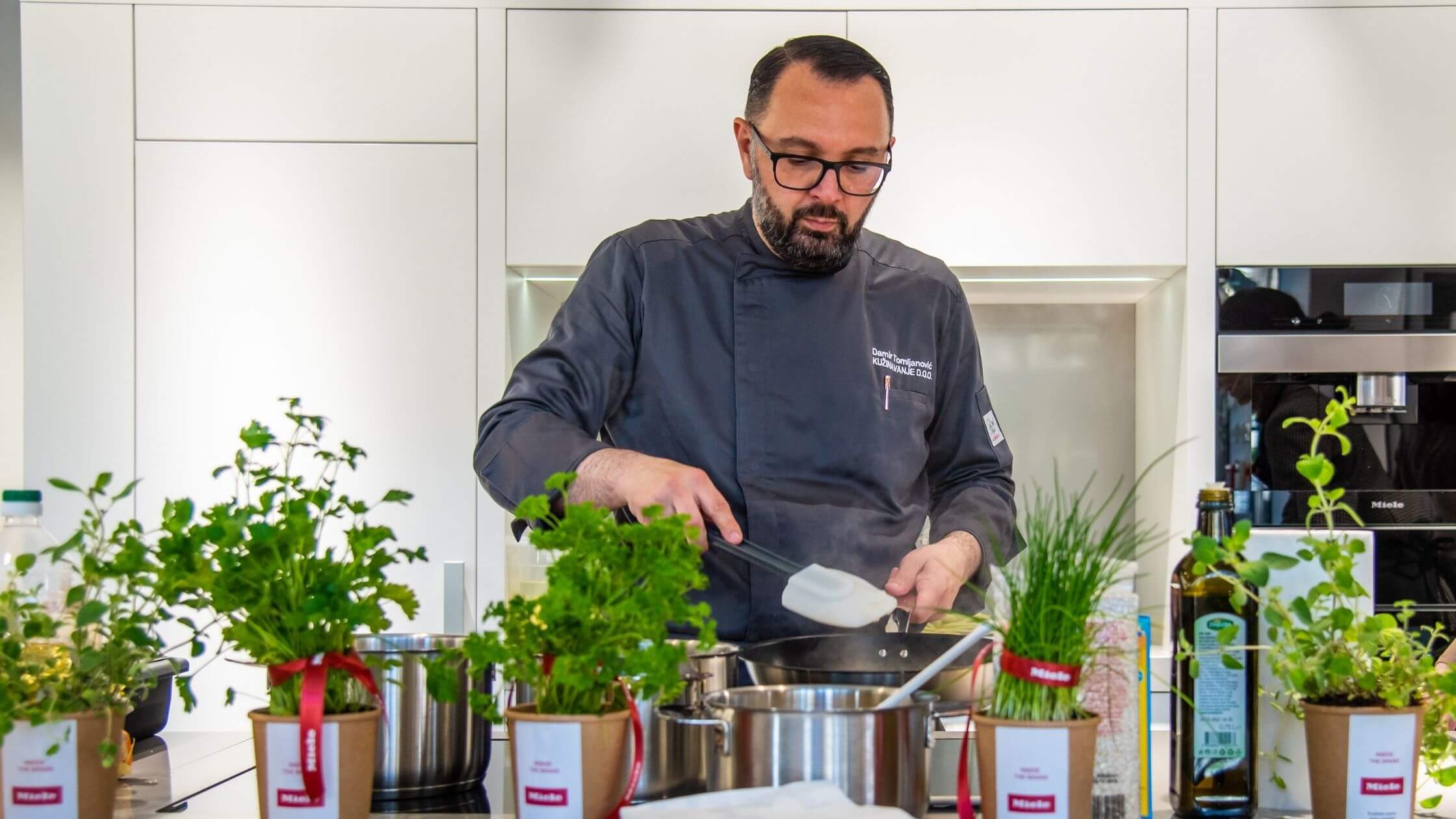
The man himself, Damir Tomljanović. Image: Ivan Gracin/Official photographer.
Hailing from Novi Vinodolski, Damir’s career in the food industry spans over 3 decades. His foray into gastronomy in 1990 was of no surprise considering how he grew up in a food-centric family, where his father was a butcher and mother, a talented culinarian. Since then, he has taken on roles as a chef at acclaimed restaurants like Bevanda and Foša, with stints as a caterer, consultant, and culinary instructor, hoping to inspire the next generation of talented chefs.
Despite his wealth of experience, a key theme that chef Damir has stayed true to over time is the importance of the foundations of a dish. This means the emphasis on local, high-quality, seasonal ingredients, transformed into traditional Croatian dishes with a modern twist.
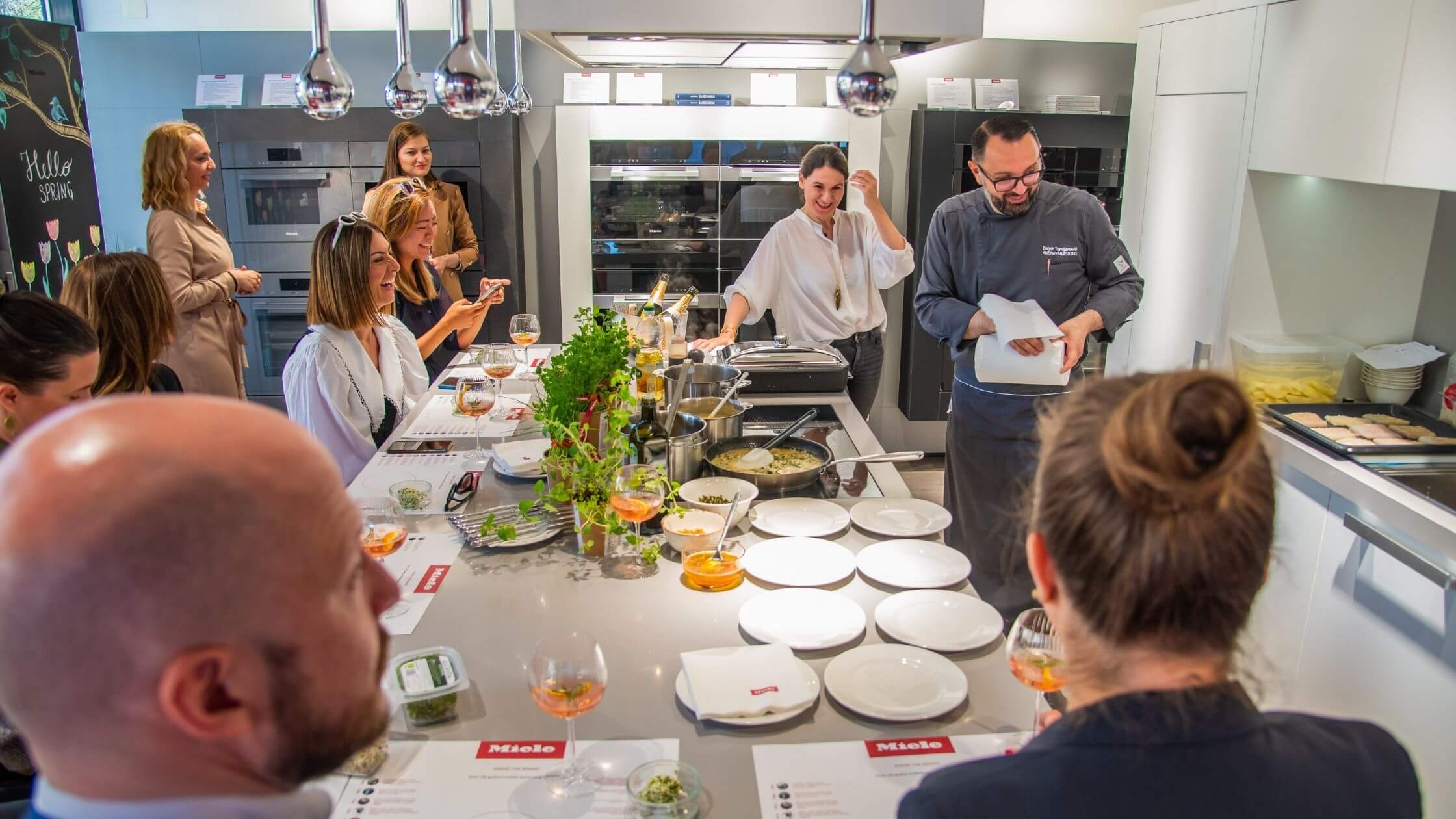
Brunch attendees at Miele Experience Centar, Split. Image: Ivan Gracin/Official photographer.
At his masterclass held in the sleek kitchen of the Miele Experience Centar Split, together with social media influencers, journalists from Slobodna Dalmacija, Dalmacija Danas, and the Miele team in Croatia, I got to witness how to create magnificent dishes in just a fraction of the time with the help of top-of-the-line kitchen technology.
Let the festivities begin!
Brunch opened with the ‘pop’ of a champagne cork by none other than one of the world’s largest producers of fine champagne in France, Moët et Chandon. Their Garden Spritz, a blend of Chandon sparkling wine and house-made bitters made with fresh Valencia oranges, was likened to an Aperol Spritz in a bottle and provided a refreshing start for even better things to come.
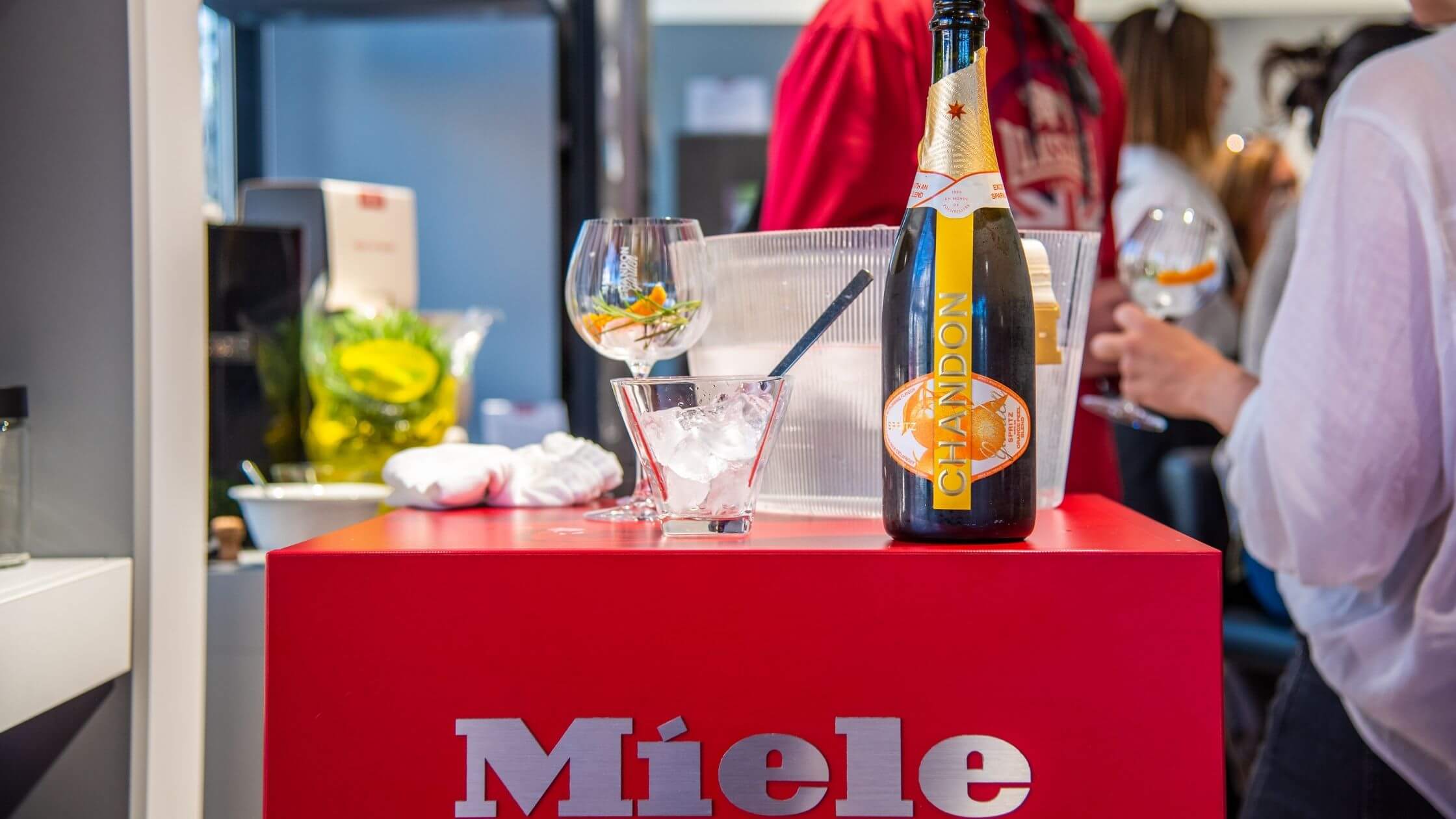 A light, refreshing beverage, perfect for sipping on warm Split Summer nights. Image: Ivan Gracin/Official photographer.
A light, refreshing beverage, perfect for sipping on warm Split Summer nights. Image: Ivan Gracin/Official photographer.
We were one of the lucky few who were able to enjoy a glass (or more!) of Chandon’s Garden Spritz since it had only been launched in Croatia the month before! Served in a delicate vintage glass with a sprig of rosemary and orange peel, the wider bowl allowed the aroma of the oranges and bitters to reveal themselves while retaining a steady stream of bubbles to tickle the palate. If Croatian Summers came in a bottle, Chandon’s Garden Spritz would be the closest they’d get.
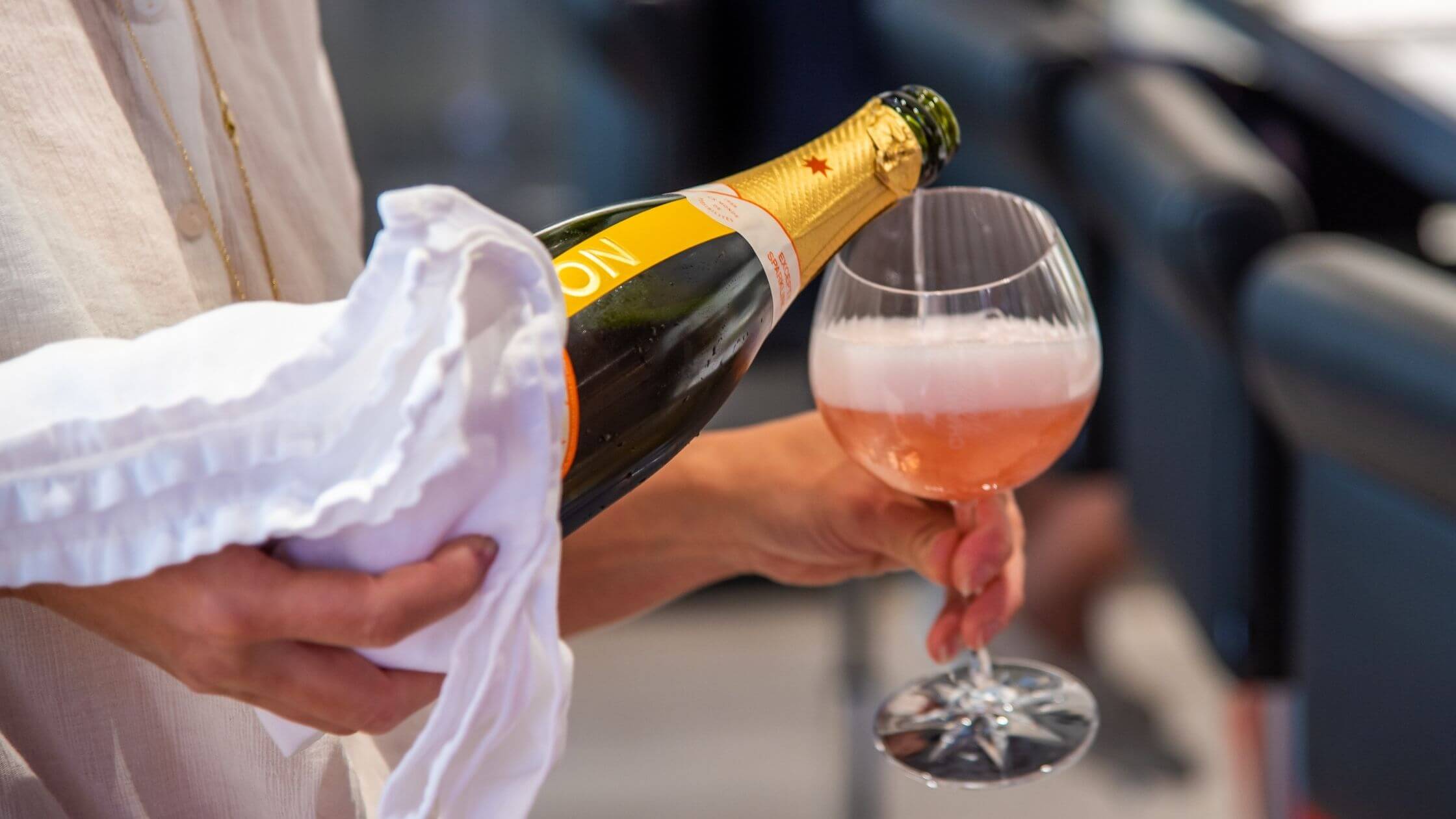
A wonderful accompaniment to any Brunch table. Image: Ivan Gracin/Official photographer.
A reason for celebration
While the first glass went down almost too easily, I couldn’t think of a better way to celebrate the 5th year of Miele’s flagship store opening in Split, as well as the launch of their new Generation 7000 built-in cooking appliances.
The launch of Generation 7000 is considered one of the largest and most innovative for Miele. With over 160 new built-in models across 6 product groups, this ‘smart’ range focuses on making tasty meals with utter ease, without sacrificing your safety in the process. Words that make amateur home cooks like me who are constantly juggling 4 different elements on the stove while trying to burn anything, swoon.
And can I just quickly rave about the aesthetics of this new line? With 4 distinct looks to choose from - PureLine, VitroLine, ArtLine, and ContourLine, it’ll be easy for you to find something that complements and augments the design of any space.
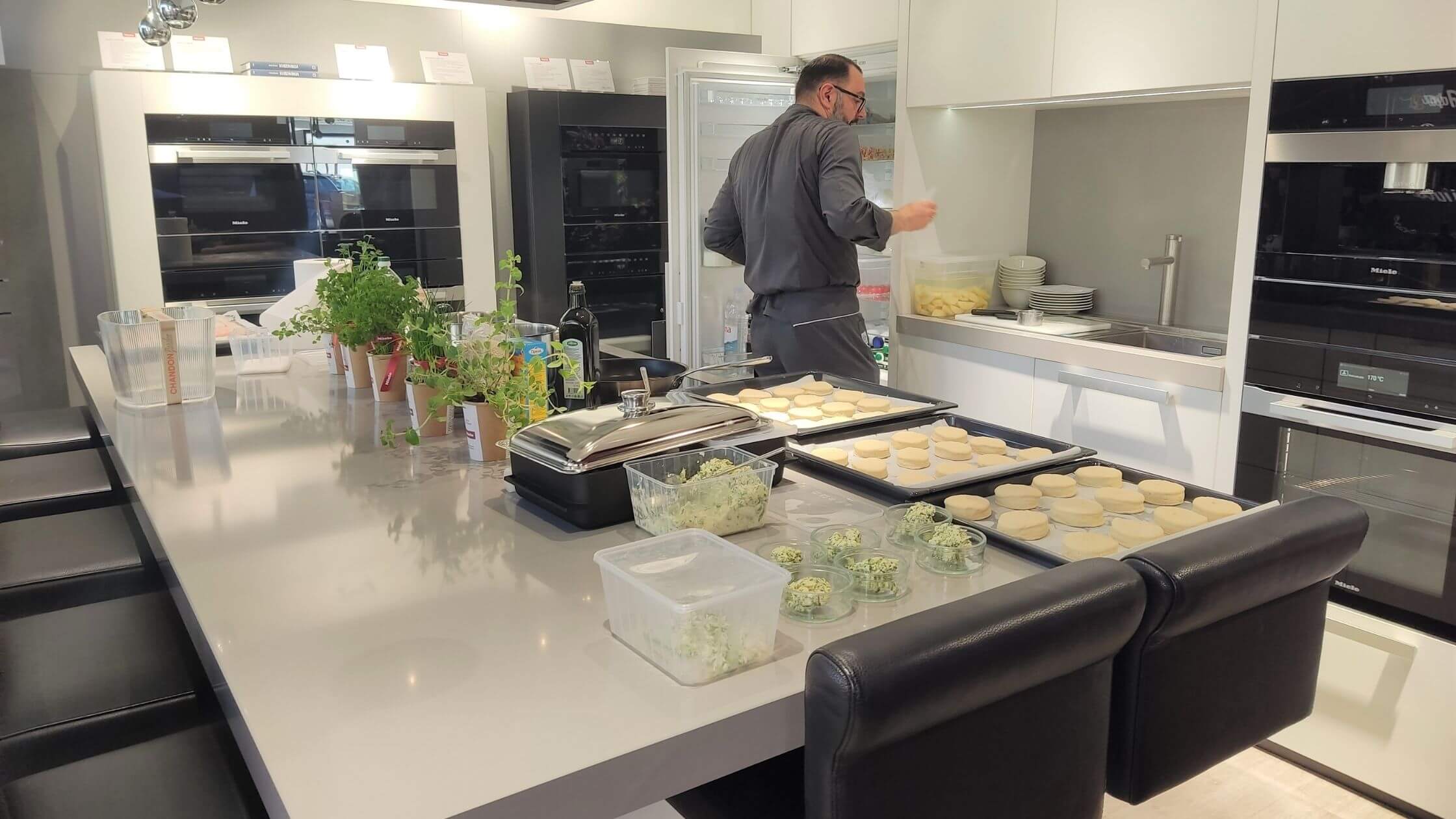
Chef Damir in his element at the Miele Experience Centar test kitchen. Image: Author’s own.
With their continued success, it can be hard to imagine that the world’s largest family-owned premium appliance manufacturer had humble beginnings that span over a century. It all started in Herzebrock, Germany, in 1989, when founders Carl Miele and Reinhard Zinkann introduced the humble cream separator and butter churner.
Over the last century, Miele has continued to expand their product range, manufacturing a series of consumer appliances including washing machines, vacuum cleaners, dishwashers, combination ovens, refrigerators, freezers, and more. The company also has a commercial arm that produces industrial equipment such as medical disinfectors and glassware washers.
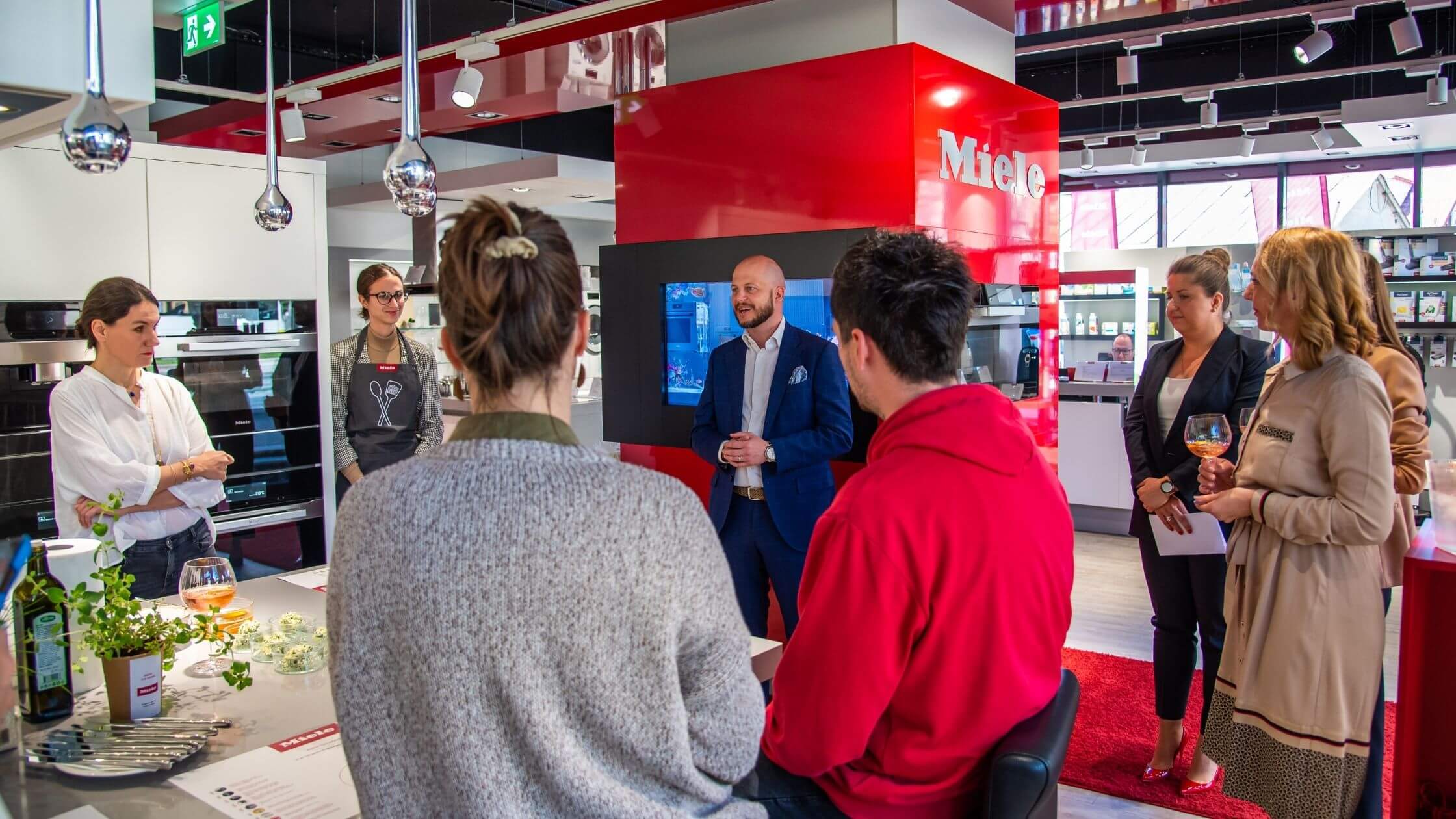
Josef Asbock, Director of Miele Croatia, Slovenia, Bosnia and Hercegovina extending a warm welcome. Image: Credits.
But of course, with all the talk about how ‘smart’, sleek, and innovative these kitchen appliances are, do they produce dishes to impress even the toughest of critics? The answer, in a nutshell, is - most definitely, and in a fraction of the time to boot.
Let’s dive into the delectable courses that chef Damir whipped up, showcasing a diverse series of cooking techniques to put the Generation 7000 to the test. Here’s what was served up during brunch:
- Freshly baked bread rolls with a homemade wild garlic butter
- Wild asparagus risotto, topped with Adriatic shrimp tartare & Pag cheese cream
- Poached Hake with Spring vegetable couscous and Jerusalem artichoke puree
- Roast lamb with potatoes
- Coffee and treats from Split’s acclaimed O’š kolač
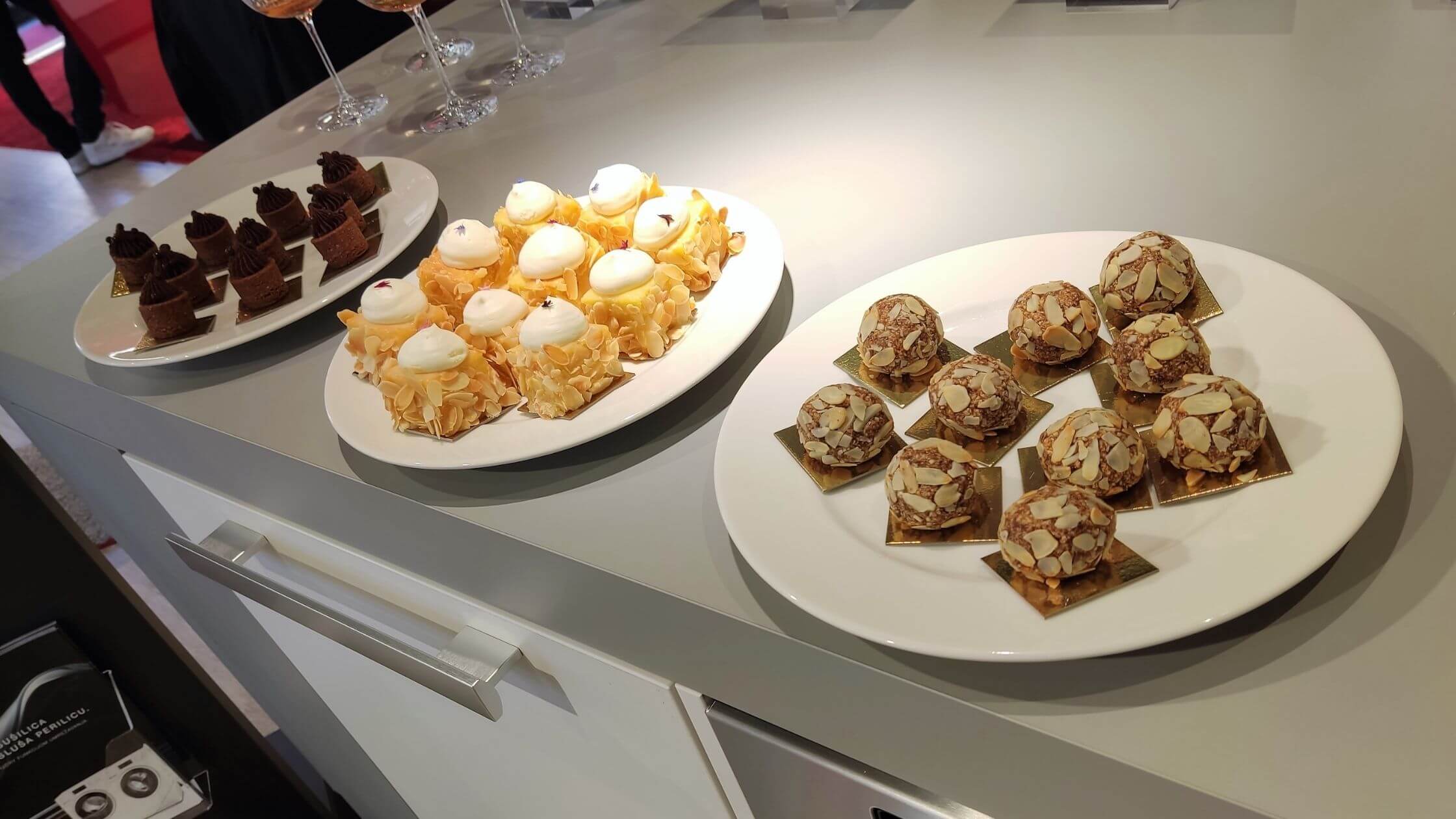
Sweet treats by O’š kolač, owned by renowned pastry chef Tea Mamut. Image: Author’s own.
The main event
Our gastronomic journey began with freshly baked bread rolls, paired with a compound butter infused with wild garlic shoots. Speaking of using local ingredients, the wild garlic comes from the fields of one of Damir’s former students! I couldn’t resist smothering the butter on the still-warm rolls, which went from raw dough to toasty bundles of carb joy in a mere 10-minutes thanks to the Generation 7000 combination steam oven.
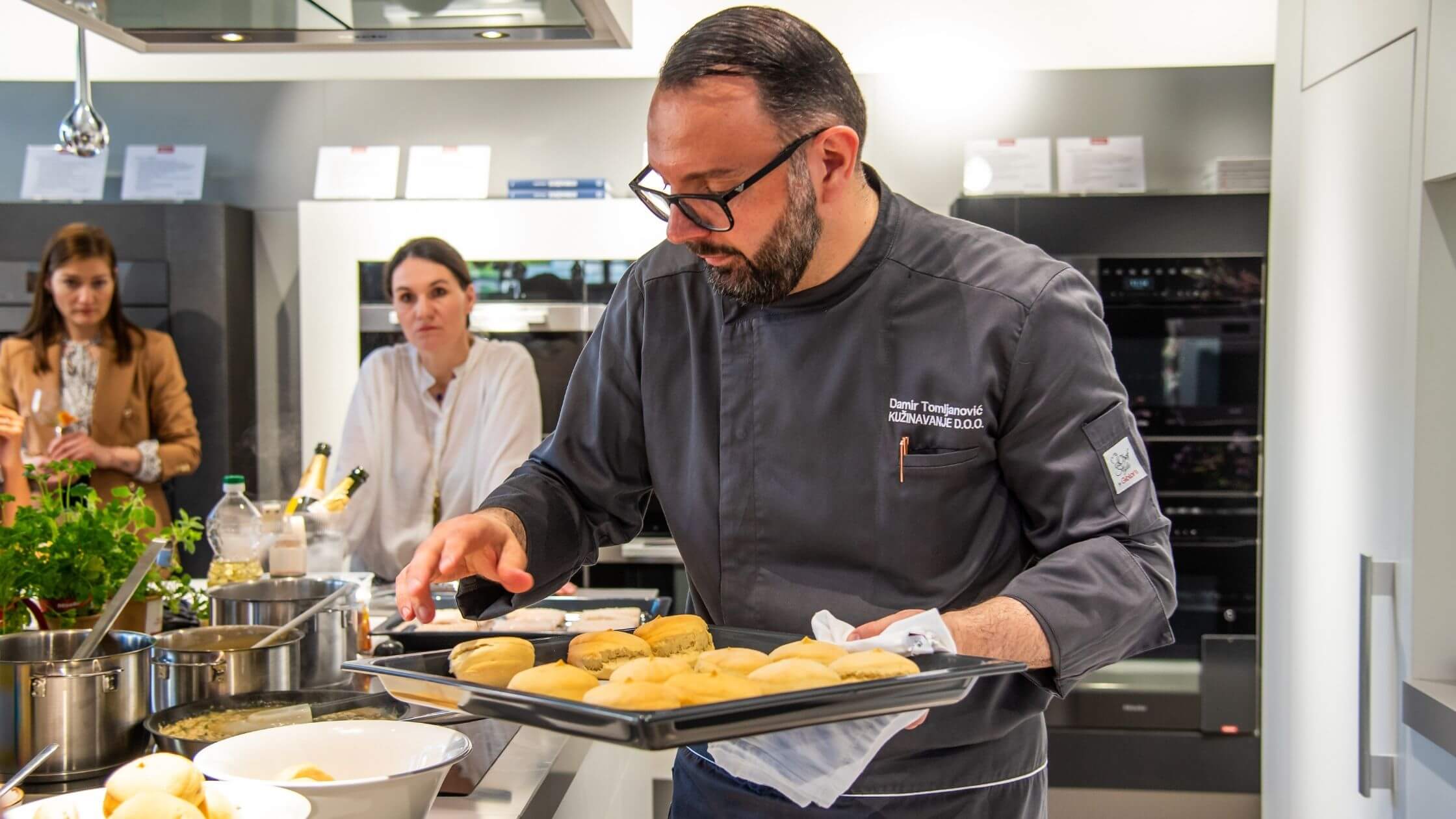
Freshly baked bread rolls, lathered generously with wild garlic butter. Image: Ivan Gracin/Official photographer.
Just as I was about to reach for another one of those fluffy rolls, chef Damir started tossing the in-season wild asparagus risotto. I noticed he had been working on the dish for the past 20 minutes, gradually adding ladle after ladle of stock while stirring, gauging, and tasting, his senses honed through the wealth of experience.
Just before tossing, he added a sturdy amount of cold butter, one square at a time. But rather than continuing to stir the rice as he did earlier, he proceeded to toss the contents of the entire pan as I sat mesmerized by wave after wave of risotto. The process was so masterfully executed that not even a single gain fell from the pan. Magnificent!
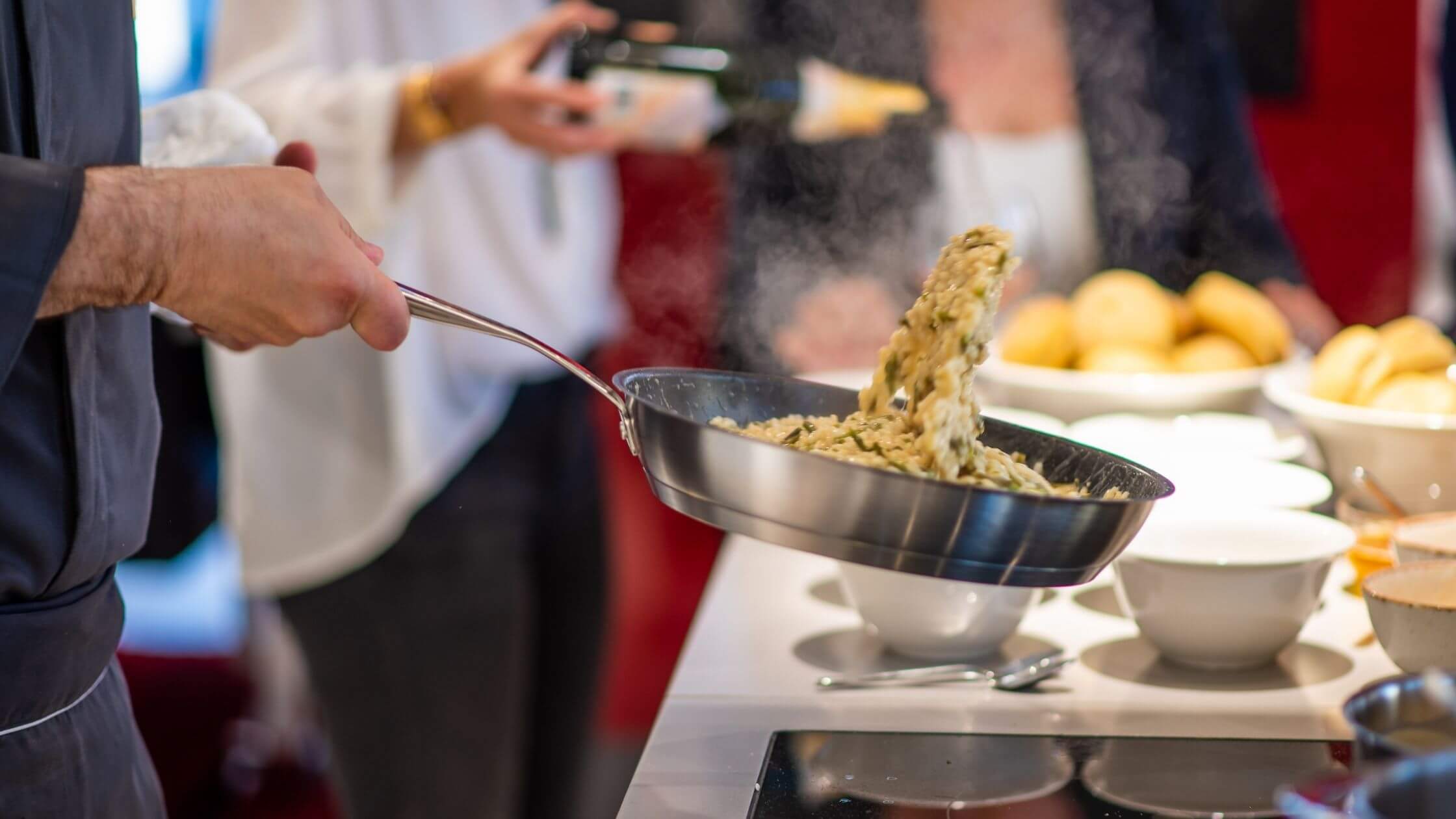
Not a single grain out of place! Image: Ivan Gracin/Official photographer.
This was a classic execution of mantecare, an Italian culinary term essential for making risotto where the butter is mixed (in this case, tossed) vigorously until it develops its desired creaminess.
The wild asparagus risotto was finished off with Adriatic shrimp tartare, Pag cheese cream and crispy onions lighted toasted in chili oil. Chef explained how each ingredient was carefully chosen to add texture and another dimension to an already stellar dish.
As I spooned a mouthful, the smooth, creamy texture gave way to the chew of each individual grain of rice that was perfectly al dente, soaking up just enough of the rich stock to flavor and hold the dish together. Highly impressive for a dish that made no use of cream or cheese to achieve the luscious texture and aroma.
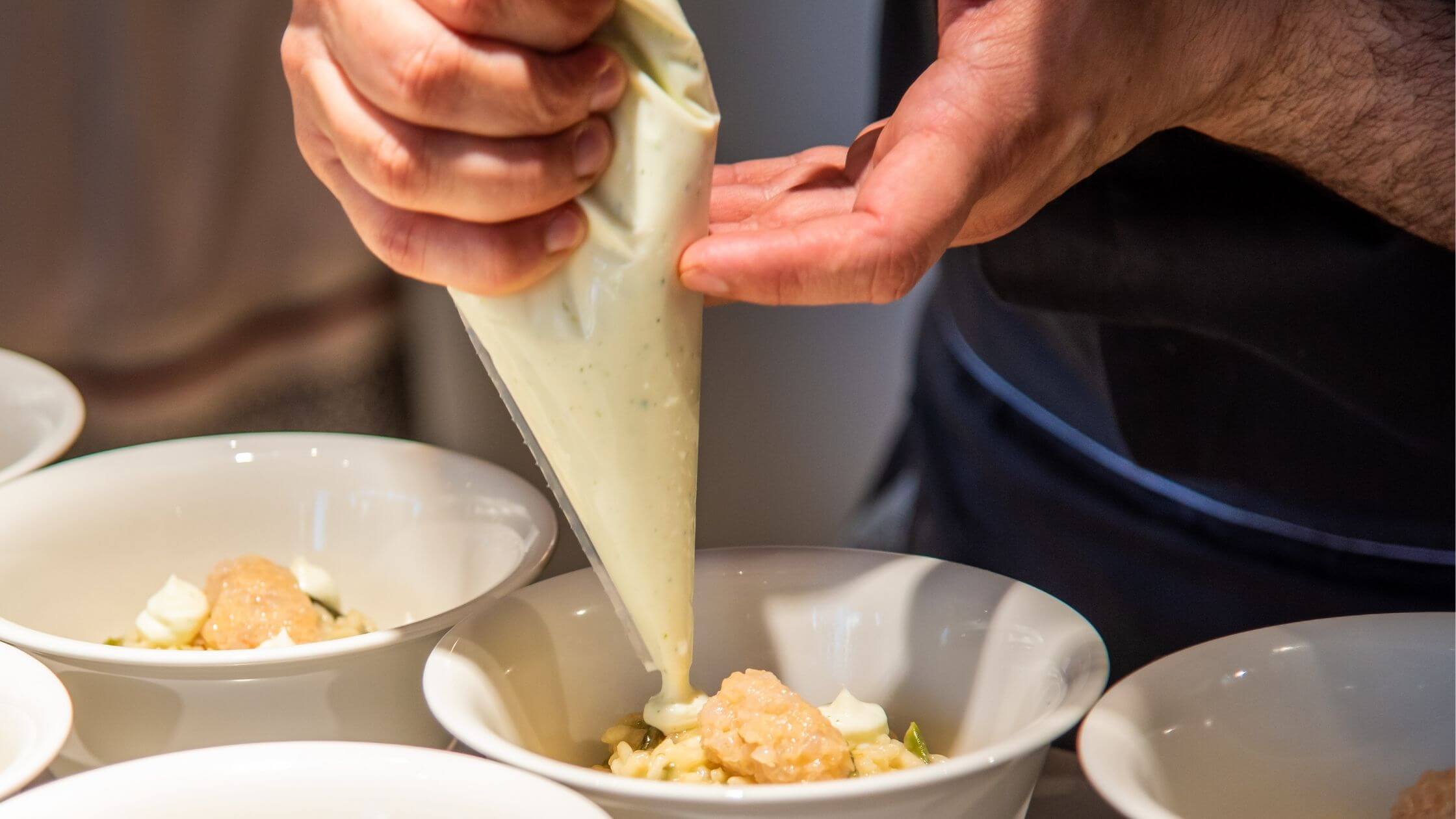
Chef Damir adding the final touches of Pag cheese cream to the wild asparagus risotto. Image: Ivan Gracin/Official photographer.
As chef Damir added, making a great risotto usually requires plenty of time and attention to detail to avoid the pasty, gluey texture that you sometimes get with poorly made risotto. With the Miele induction stove, intelligent temperature sensor technology ensures constant and precise heat output, even allowing Damir to briefly take his eyes off the stove from time to time to detail his method and techniques to cooking the perfect risotto with us.
The next dish to follow the risotto was a lighter, but not any less delicious, fish course. A beautifully plated steamed Hake paired with Spring vegetable couscous, sitting atop a puree of Jerusalem artichoke which was finished off with a light drizzle of browned butter.
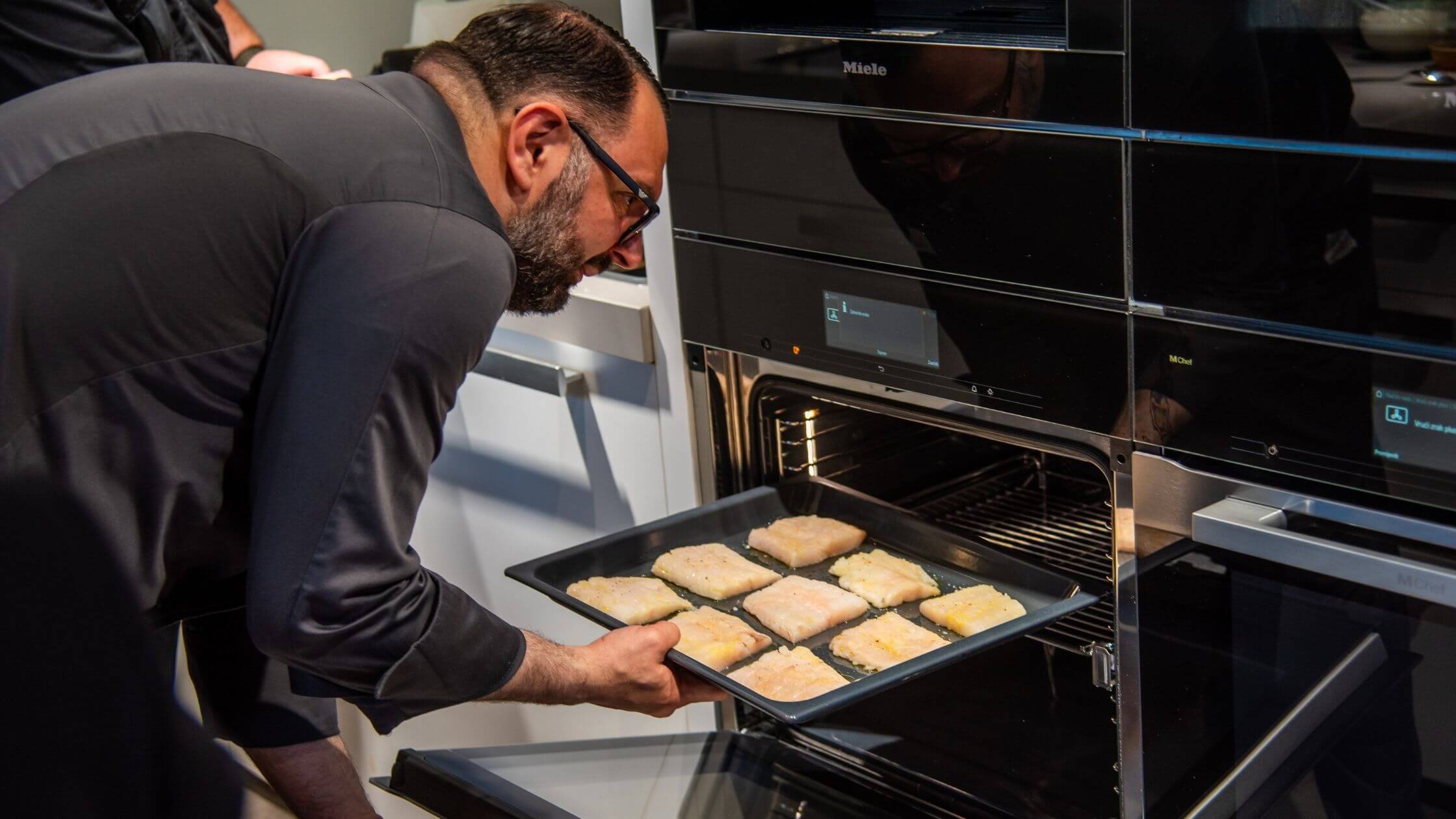
Putting the Hake in Miele’s Dual steam stove. Image: Ivan Gracin/Official photographer.
With the same combination oven as the bread rolls, it took a mere 10 minutes to steam the Hake that was seasoned with just a sprinkling of salt and pepper. This was intentional so as not to mask the freshness of the filet, while simultaneously preserving all its natural flavors and juices.
While plating the fish, chef Damir took the opportunity to expand more on his “back to basics” concept. Reminding us of the importance of good ingredients as the foundation of not just a sophisticated dish, but more essentially, a healthy body and mind. He also described the local agricultural scene in Croatia, and how consumers should strive harder to eat locally and seasonally to respect the natural crop cycles.
On that note, the steamed Hake was served. With just a light prod of my fork, the perfectly steamed fish flaked away into nice, firm chunks. The first bite revealed a mild, slightly sweet fish, elevated by the warm nuttiness of the browned butter. The accompanying couscous was kept simple. Tossed with a medley of vegetables that were expertly brunoised into the smallest uniformed morsels, providing a satisfying crunch.
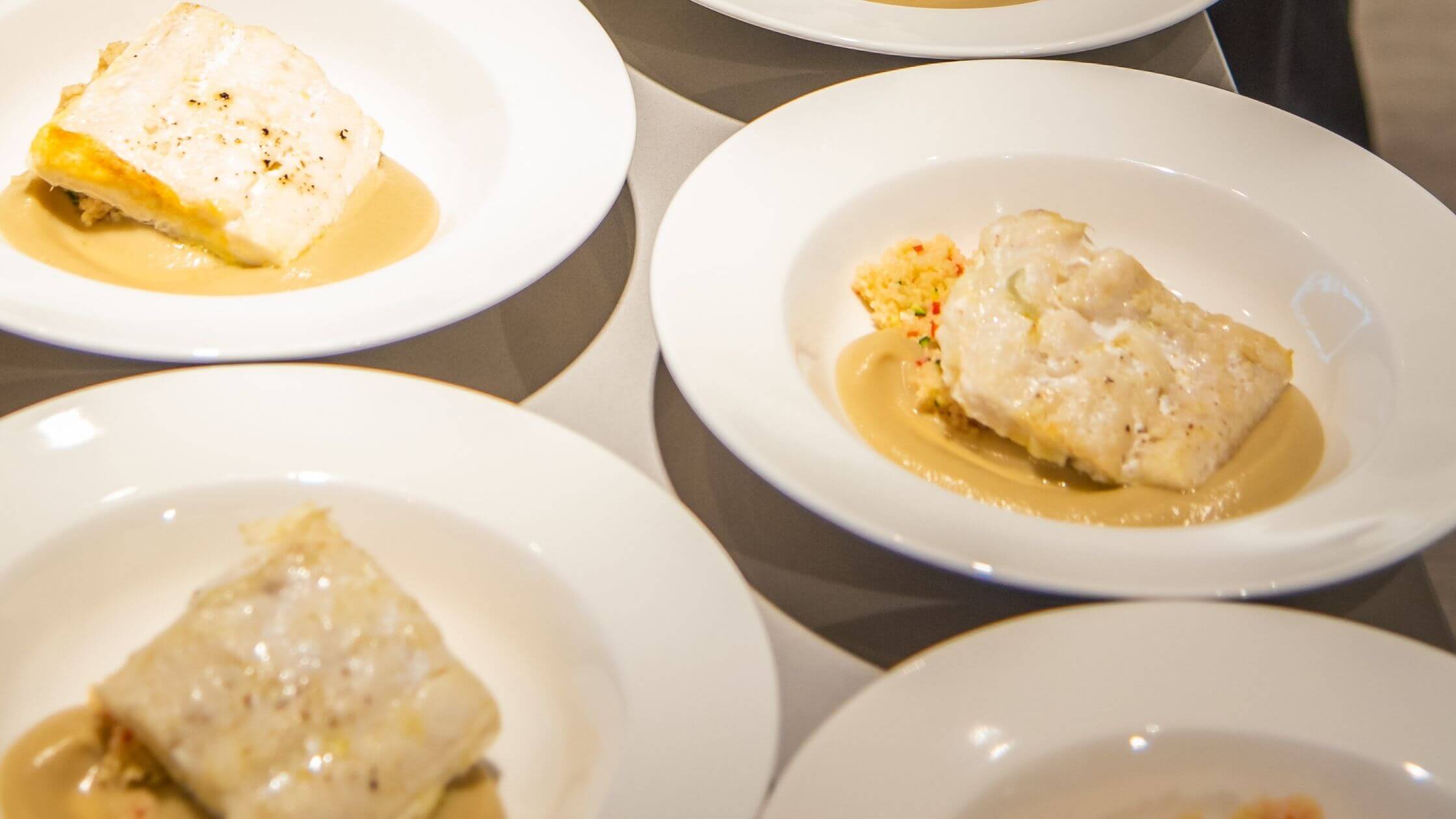
The final plating. Image: Ivan Gracin/Official photographer.
The accompanying Jerusalem artichoke puree was so sweet, delicate, and creamy that I could have easily finished an entire bowl of this in one sitting. The chef later let us in on the fact that nothing was added to season the dish, allowing the artichoke’s natural flavors to take center stage.
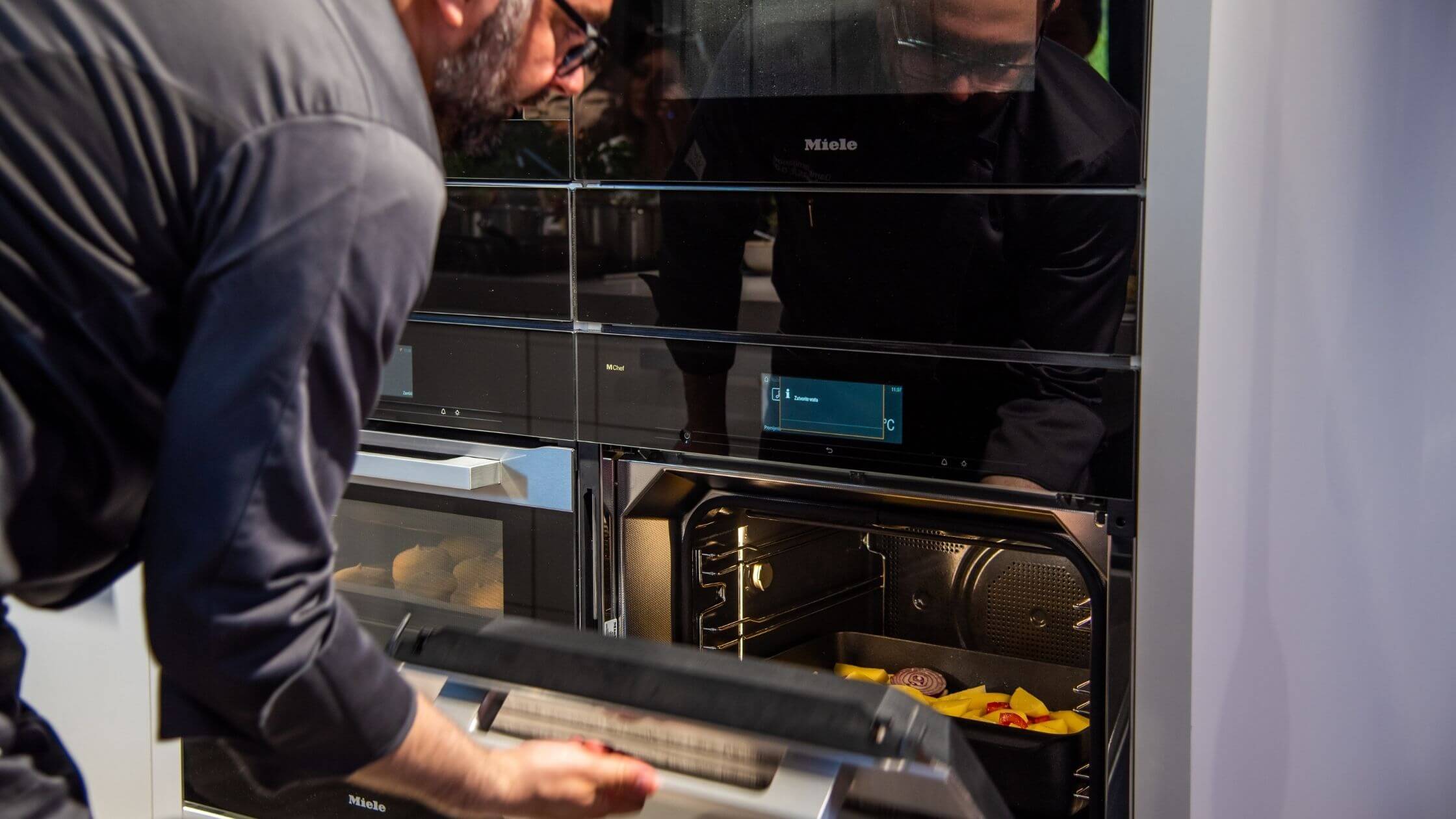
Chef Damir taking the lamb out of the Miele’s Dialog stove. Image: Ivan Gracin/Official photographer.
Just as I thought I couldn’t get any more stuffed, the roast lamb with potatoes was up next. I knew I shouldn’t have had those extra bread rolls, but unfortunately, my love for carbohydrates knows no bounds.
Now, anyone who’s oven-roasted a rack of lamb or even poultry (e.g., chicken or turkey) will fully understand when I say, it’s really, really challenging to ensure the entire roast remains equally tender despite the difference in cooking times between the breast and thigh meat for instance. There have been countless dinner mishaps when the resulting roast comes out dry and tough in one area, but completely undercooked in another.
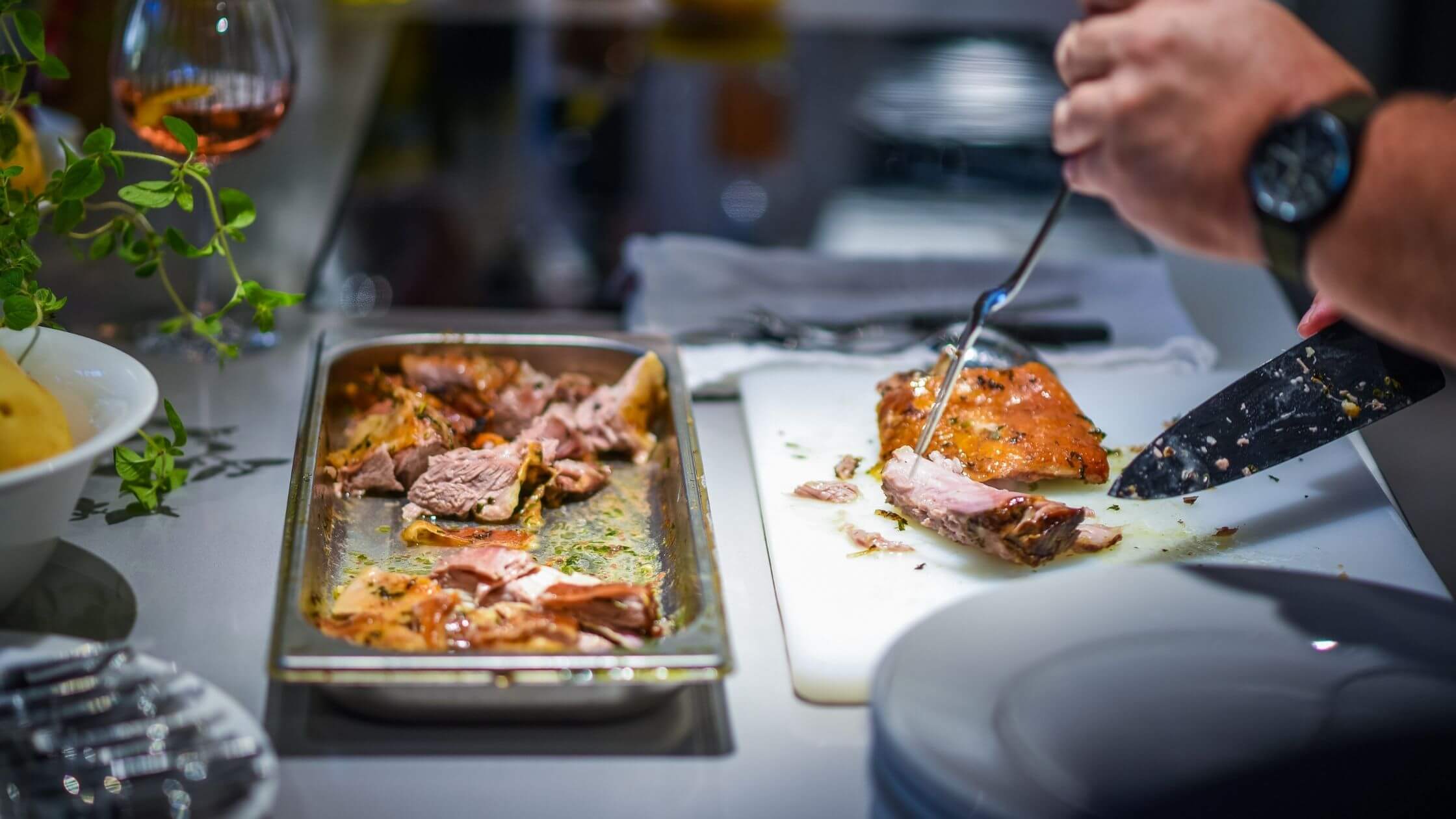
The skin of the lamb managed to crisp up while the meat remained a tender pink on the inside. Perfection. Image: Ivan Gracin/Official photographer.
No surprise that chef Damir managed to impress the crowd yet again. The lamb was perfectly cooked through, with each bite uniformly juicy and tender, regardless of the cut that was plated for us.
As it turns out, the lamb was prepared using Miele’s M Chef technology. Developed in 2017 and using the aid of sensors, M Chef continuously interacts with the food during the cooking process. This process allows the Dialog oven to closely monitor and adjust the temperature to ensure heat is distributed evenly through the meat, cooking it to your desired perfection.
As the event rolled to a close, filled with such amazing food and drink, I felt like I was ready for a nap. What an experience! Not only did I get to savor delicious dishes made by a Masterchef judge and drink champagne before noon, but how advances in culinary technology continue to make the preparation of nourishing, tasty dishes, more accessible to everyone in the comforts of their own home.
As I sipped on my espresso to jolt me from my food coma, I was already trying to suss out when the next Masterclass was taking place, and what other Croatian culinary delights awaited the next group of lucky attendees!
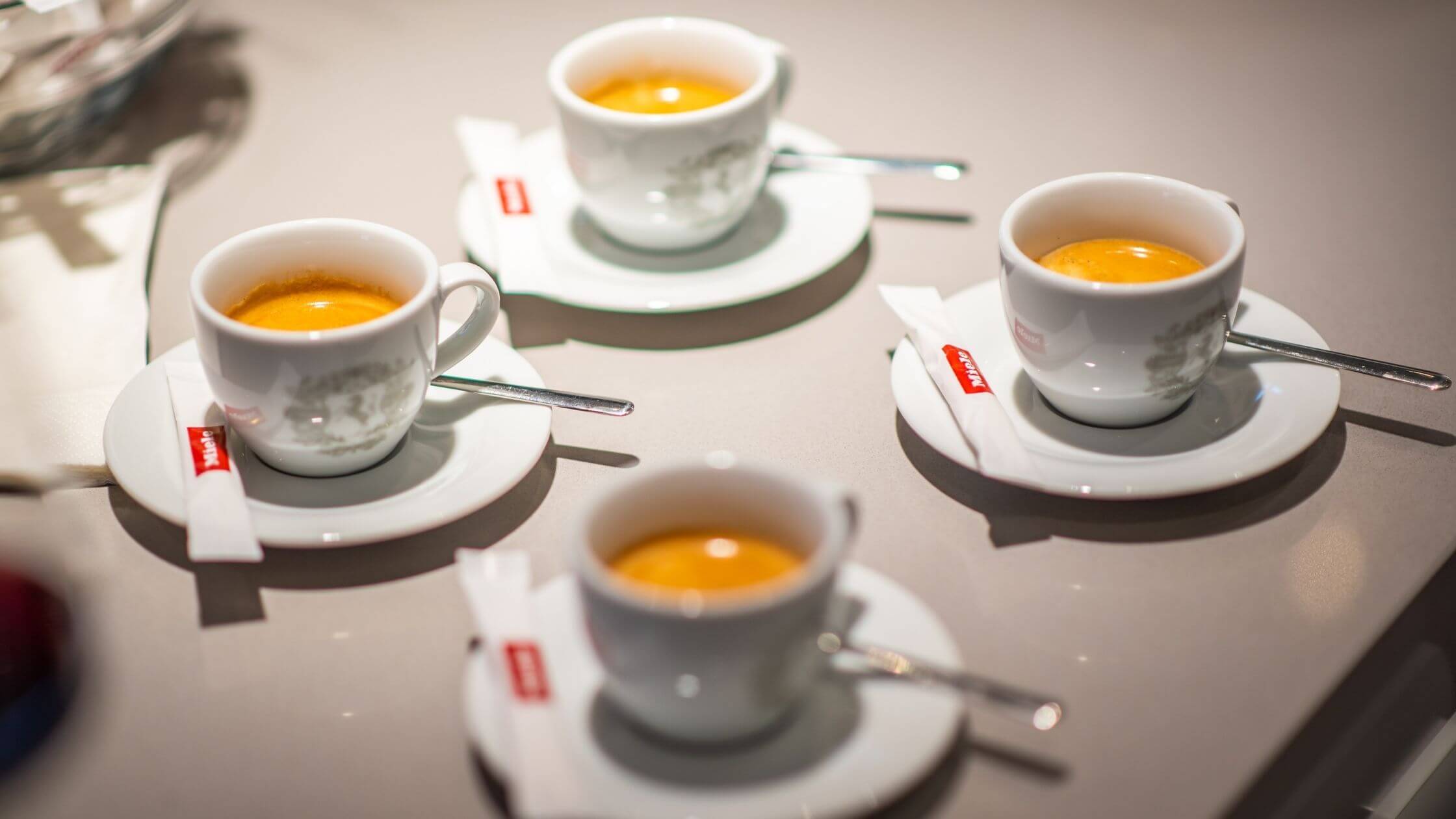
The perfect espresso, made with Miele’s built-in, bean-to-cup coffee machines. Image: Credits.


